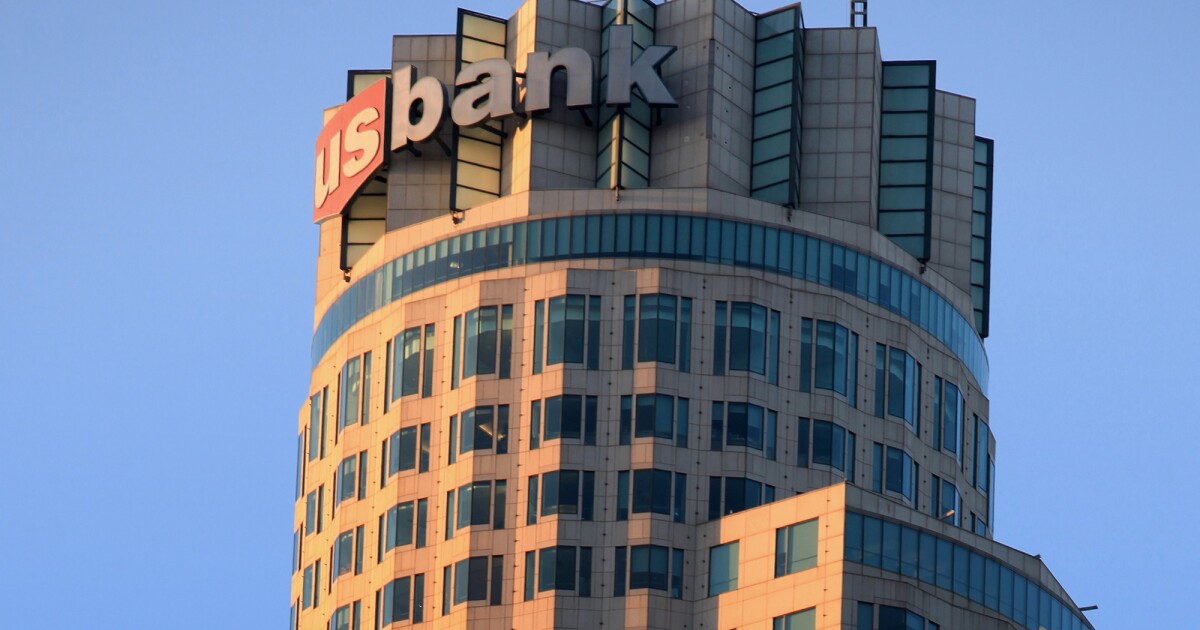
Downtown Los Angeles skyscraper U.S. Bank Tower will be sold at a discount to the developer of One World Trade Center in New York as the pandemic drives down office leasing across the country and raises questions about the future appeal of high-rise office buildings.
Standing 73 stories on Bunker Hill, the cylindrical U.S. Bank Tower is one of the most prominent buildings on the city skyline and one of the tallest structures west of the Mississippi River. It opened in 1989 and has also been known as Library Tower and First Interstate World Center.
Singapore real estate company OUE Limited said Friday that it will sell the property for $430 million, a 34% discount from the $650 million valuation OUE declared in its annual report last year but still an increase from the $367.5 million OUE paid for it in 2013.
The sale will enable OUE “to streamline its asset ownership in a period when the longer term outlook of the U.S. property market may not be favorable,” the company said in a statement.
“Due to the measures implemented by state governments in the U.S. in response to the COVID-19 pandemic, the tenants in the property have reduced, or temporarily closed down, their operations, and the rental income from the property has been correspondingly affected,” OUE said.
Buying the property at 633 W. 5th St. in a deal set to close in September is Silverstein Properties, a private real estate developer and landlord based in Manhattan that has been looking to expand in the West. The company has residential buildings and hotels but is best known for its office portfolio in New York that includes the World Trade Center complex.
Silverstein Properties, founded by developer Larry Silverstein, also completed One World Trade Center in 2014 for the Port Authority of New York and New Jersey. The 104-story skyscraper replaced the World Trade Center towers destroyed in the Sept. 11, 2001, terrorist attacks.
The company’s head of acquisitions Jeff Grasso said in a statement that Silverstein Properties is “excited” to acquire U.S Bank Tower.
“This is a unique opportunity to manage a trophy asset in a dynamic market,” Grasso said. “This is our first investment in Los Angeles, and we are looking at a number of other opportunities in the city, and elsewhere on the West Coast.”
The sale is occurring at a challenging time for the office property market, which has scared off some investors, said real estate broker Todd Tydlaska of CBRE, who was not involved in the transaction.
Most offices are sparsely used as tenants work from home to avoid exposure to the coronavirus, and it’s unclear when or if they will want to come back to tall buildings.
“No one is really sure how this is going to play out,” Tydlaska said. “Will tenants be in a hurry to get back to father’s-office-type buildings, or will they want to go to the suburbs” and other places with low-rise buildings that don’t require getting into crowded elevators?
Workers in U.S. Bank Tower have to take as many as three elevators to get to their offices, starting from the six-level underground garage.
Silverstein was able to buy the property at a fraction of the cost of building it today, Tydlaska said.
The deal also reflects a push in recent years by foreign and domestic investors to grab properties in the Los Angeles region because they view it as economically diversified and buoyed by the robust media, entertainment and technology sectors.
Office leasing has stalled, however, since Gov. Gavin Newsom issued a statewide stay-at-home order in mid-March. Leasing in Los Angeles County fell to its lowest point since the Great Recession in the second quarter, about 60% to 70% below normal for that time of year, according to CBRE.
Deals were put on hold or canceled because even walking into an office building seemed risky as the novel coronavirus spread.
At the same time, the overall vacancy rate of 12.8% was lower than in the second quarter last year, and monthly asking rental rates held steady at about $3.87 per square foot for Class A space, CBRE said.
U.S. Bank Tower has more than 1.4 million square feet, and about 22% of that is not leased to tenants, according to real estate data provider CoStar. Average office vacancy in downtown’s central business district was 13% in the second quarter, CBRE said.

